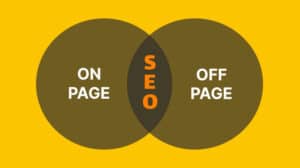Search Engine Optimization (SEO) plays a crucial role in improving a website’s visibility on Google and other search engines. To rank higher, you need to focus on On-Page SEO and Off-Page SEO strategies. While both are equally important, they serve different purposes in digital marketing. Let’s understand the difference between On-Page and Off-Page SEO in detail.

What is On-Page SEO?
On-Page SEO refers to all the techniques applied directly within your website to improve rankings. It ensures your site is optimized for both search engines and users.
Key Elements of On-Page SEO:
-
Title Tags & Meta Descriptions – Well-optimized meta information boosts click-through rates.
-
Keyword Optimization – Using SEO keywords naturally in headings, content, and URLs.
-
Content Quality – Publishing SEO-friendly content that provides value.
-
Internal Linking – Connecting relevant pages within your site for better navigation.
-
Mobile-Friendliness – Ensuring responsive design for all devices.
-
Page Speed Optimization – Fast-loading sites rank better.
✅ Example: Optimizing a blog post with target keywords, adding alt tags to images, and improving content readability.
What is Off-Page SEO?
Off-Page SEO refers to all activities performed outside your website to boost its credibility and domain authority. These strategies signal to search engines that your website is trustworthy and authoritative.
Key Elements of Off-Page SEO:
-
Backlink Building – Getting quality links from high-authority websites.
-
Social Media Marketing – Sharing content on platforms like Facebook, Instagram, and LinkedIn to drive traffic.
-
Guest Posting – Publishing content on other websites with backlinks to your site.
-
Influencer Outreach – Collaborating with influencers for brand mentions.
-
Local SEO – Optimizing Google Business Profile for location-based searches.
✅ Example: Earning backlinks from industry blogs or being featured in an online directory.
Main Difference Between On-Page and Off-Page SEO
| Aspect | On-Page SEO ✅ | Off-Page SEO ✅ |
|---|---|---|
| Focus | Optimizing elements inside the website | Building authority outside the website |
| Key Activities | Keywords, meta tags, content, internal links, page speed | Backlinks, guest blogging, social media, influencer marketing |
| Control | 100% under your control | Depends on external sources |
| Goal | Improve website usability and content relevance | Improve website authority and trustworthiness |
Why Do You Need Both On-Page and Off-Page SEO?
-
On-Page SEO ensures your website is search-engine friendly.
-
Off-Page SEO boosts your credibility and increases domain authority.
When combined, they create a strong SEO strategy that helps you achieve higher rankings, more organic traffic, and better conversions.
Final Thoughts
Understanding the difference between On-Page and Off-Page SEO is essential for every business looking to grow online. By focusing on content optimization, keyword research, backlinks, and social signals, you can build a powerful SEO strategy that improves both visibility and credibility.
If you want long-term success in digital marketing, invest in both On-Page SEO techniques and Off-Page SEO strategies for maximum results.
